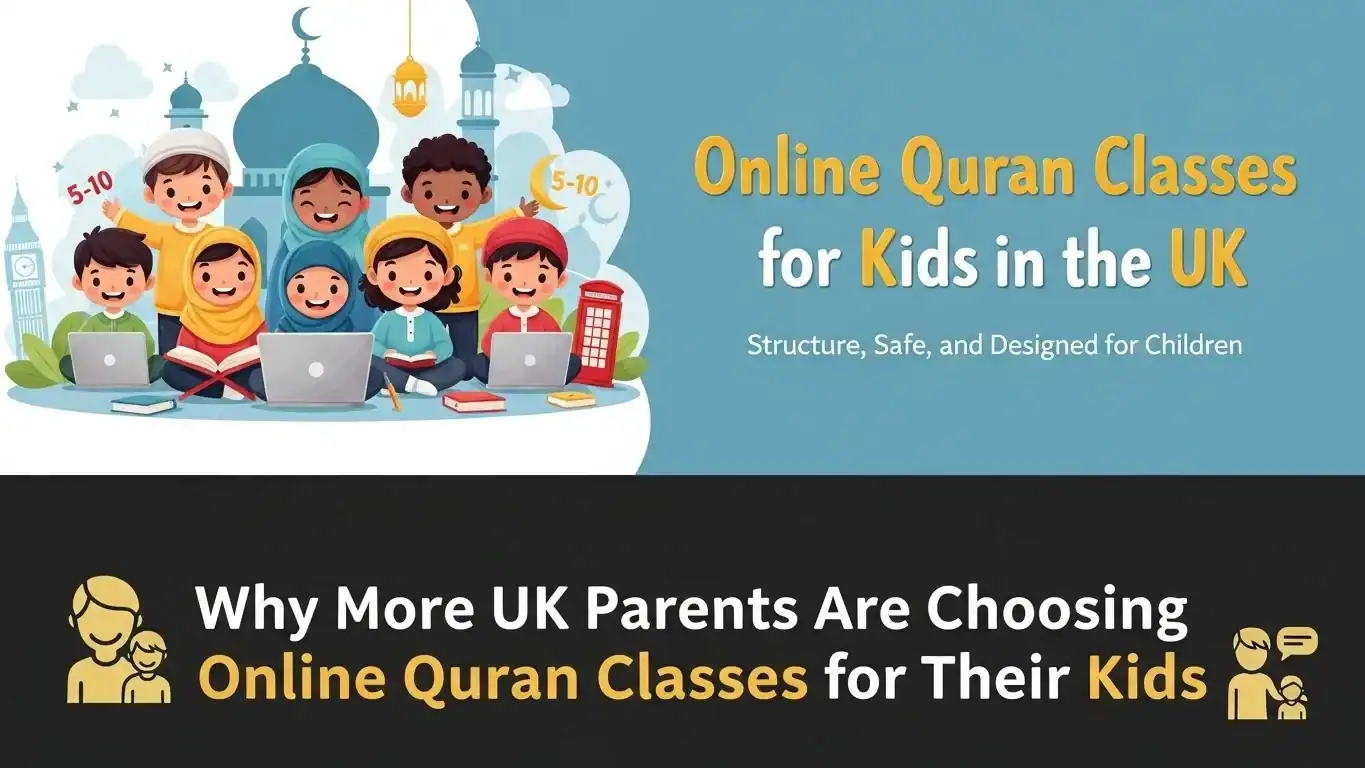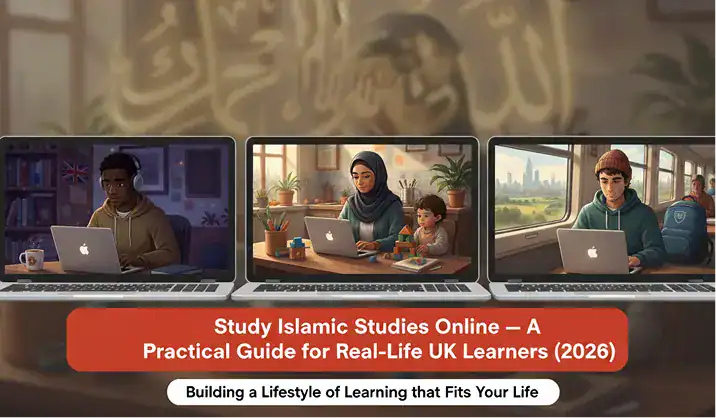Overview
Want a clear path to stronger iman—without overwhelm?
Islamic Studies shows you how to turn knowledge into daily worship and character.
-
Learn core beliefs with real-life application.
-
Form habits that anchor faith in busy UK life.
-
Grow morals, confidence, and community impact.
How Islamic Studies Answer Today’s Challenges
Modern life is fast, distracting, and value-blurring.
How Islamic Studies provides anchors, clarity, and purpose.
-
Filters trends through Quran & Sunnah.
-
Replaces guilt loops with gradual routines.
-
Builds resilience against doubts & peer pressure.
-
Aligns goals with akhirah-minded success.
How Islamic Studies Solve Modern Challenges
How Islamic Studies gives UK Muslims practical tools to navigate a fast, noisy, and value-confusing world.
-
Helps filter online trends through Quranic ethics before following them
-
Builds confidence through Prophetic Biography models instead of influencer culture
-
Offers Fiqh Principles that simplify daily decisions around work, school, and lifestyle
-
Reduces anxiety by grounding choices in certainty, not social pressure
-
Supports balanced routines that protect iman during busy UK schedules
How Islamic Studies Strengthen Daily Faith
Iman grows when knowledge meets action.
How Islamic Studies turns intentions into repeatable habits.
-
Salah on time with khushūʿ frameworks.
-
Short daily tadabbur, not marathon readings.
-
Dhikr stacks tied to morning/evening cues.
-
Micro-charity and weekly community service.
How Islamic Studies Guide Daily Habits
How Islamic Studies turns everyday routines into opportunities for worship and character-building.
-
Uses short reminders to anchor habits to existing cues (tea time, commute, breaks)
-
Encourages planning worship around realistic UK work–study cycles
-
Helps create mini-routines: morning dhikr, evening reflection, weekend review
-
Guides ethical habits online and offline, from speech to screen-time
-
Builds consistency through “small but continuous” actions the Prophet taugh
How Islamic Studies Build Moral Character
Akhlaq is faith made visible.
How Islamic Studies translates principles into behaviour.
-
Truthfulness at work and online.
-
Amanah in deadlines and promises.
-
Sabr in stress, shukr in ease.
-
Fairness with family, peers, and strangers.
An Integrated Approach to Education
Islamic Studies blends with other academic subjects to create a well-rounded education. By learning from Islamic history and exemplary figures, students develop virtues such as humility, patience, and generosity.
Benefits of an integrated approach:
- Building moral character alongside academic growth
- Encouraging ethical decision-making
- Linking Islamic teachings to real-world applications
- Promoting balanced spiritual and intellectual growth
How Islamic Studies Develop Critical Thinking
Islam invites reflection, not blind copying.
How Islamic Studies grows reasoning with evidence.
-
Ask well; verify sources; avoid hot takes.
-
Compare opinions with usūl, not impulses.
-
Learn fiqh method → better life decisions.
-
Build a learner’s mindset: seek, test, apply.
How Islamic Studies Connect Knowledge to Practice
You don’t need “more info”—you need “more integration”.
How Islamic Studies links worship to outcomes.
Table: Practice → Faith → Morals
| Practice (Action) | Faith Benefit | Moral Outcome |
|---|---|---|
| Fajr on time | Consistency & tawakkul | Discipline & time-honour |
| 20-min Quran study | Deeper yaqīn | Calmer responses |
| Weekly sadaqah | Heart purification | Generosity & empathy |
| Family halaqah | Shared reminders | Responsibility at home |
| Monthly volunteering | Service mindset | Leadership & teamwork |
-
Start with 1–2 actions; stack gently.
-
Track with a simple habits grid.
-
Review monthly; celebrate small wins.
Tools and Routines That Help Apply Islamic Studies:
How Islamic Studies becomes easier to apply when supported by simple tools and structured learning.
-
A weekly habits tracker to connect lessons to action
-
Short Qur’an or hadith cards for quick daily reflection
-
A study partner or Islamic Studies Teacher Online for accountability
-
Digital notes to organise topics like Fiqh Principles or Prophetic Biography
-
Joining an Islamic Studies Course Online to follow a guided learning path
-
Choosing one learning platform to Study Islamic Studies Online consistently
message us on WhatsApp
How Islamic Studies Support Muslim Youth in the UK
Teens meet identity tension at school, socials, and media.
How Islamic Studies gives roots and reasons.
-
Clear creed → confident identity.
-
Prophetic role-models → behaviour templates.
-
Safe circles → belonging without compromise.
-
Practical fiqh → everyday clarity (diet, dress, exams).
How Islamic Studies Help with Doubts & Distractions
Shubuhāt (doubts) need calm, structured answers.
How Islamic Studies turns confusion into inquiry.
-
Name the doubt; separate emotion from claim.
-
Check sources (authenticity, context, consensus).
-
Ask qualified teachers; avoid algorithm traps.
-
Replace doom-scrolling with planned learning.
How Islamic Studies Create Community & Belonging
Faith thrives in company, not isolation.
How Islamic Studies builds circles of khayr.
-
Join a weekly study circle near you.
-
Pair up with a study buddy for consistency.
-
Serve: food banks, hospital visits, mosque tasks.
-
Mentor younger students—teach what you learn.
Practical Plan: How Islamic Studies Fit Your Week
Small, steady steps beat intense sprints.
Use this light UK-friendly routine.
Table: Weekly Planner
| Day | Action | When | Outcome |
|---|---|---|---|
| Mon | 15-min tafsir note | Commute/evening | Context & reflection |
| Tue | Hadith of the day | Lunch break | Prophetic conduct |
| Wed | Fiqa mini-topic | After Maghrib | Practical rulings |
| Thu | Sadaqah plan | Online/ATM | Habit of giving |
| Fri | Jumuʿah prep | Morning | Khutbah readiness |
| Sat | Halaqah / class | Afternoon | Peer learning |
| Sun | Review & plan | Evening | Track & adjust |
-
Keep it light; protect Fajr & ʿIsha.
-
Tie tasks to cues (after tea, commute).
-
Missed a slot? Slide, don’t quit.
How Islamic Studies Strengthen Family Life
Homes shape hearts before classrooms.
How Islamic Studies makes deen a shared project.
-
Family dua list on the fridge.
-
House adab: greetings, gratitude, gentleness.
-
Rotate surah summaries at dinner.
-
One tech-free hour for talk & games weekly.
How Islamic Studies Guide Ethical Work & Study
Career and coursework are part of worship.
How Islamic Studies sets professional adab.
-
Excellence (ihsān) in tasks, not just outcomes.
-
Honest invoices, transparent pricing.
-
Respectful disagreement; no gossip/ghibah.
-
Time-blocking around salah, deadlines, rest.
Related Learning Resources
Build a complete pathway, not random clips.
-
Online Islamic Studies Course — structured modules.
-
Quran Reading & Tajweed — sound recitation first.
-
Quran Memorisation — plan, pacing, revision cycles.
-
Arabic for Non-Arabic Speakers — vocabulary for tafsir.
How Islamic Studies Connect You to Consistent Learning
Learning formats influence spiritual growth, and Islamic Studies supports steady progress when learned online.
-
Makes it easier to Learn Islamic Studies Online with flexible UK timings
-
Allows students to review lessons at home with minimal distractions
-
Provides access to scholars and structured modules through an Islamic Studies Course Online
-
Offers personalised guidance from an Islamic Studies Teacher Online
-
Helps busy families Study Islamic Studies Online together with shared routines
FAQs: How Islamic Studies Grow Your Faith
Is Islamic Studies only theory?
No—done right, it’s knowledge → habits → character.
How long till I feel a change?
Weeks, not years—start small, review monthly.
Do I need Arabic first?
No—start in English, then add Arabic basics for depth.
What if I’m busy in the UK?
Micro-sessions work: 10–20 minutes, tied to daily cues.
How do I handle doubts?
Document them, consult scholars, and avoid reaction content.
How can parents help?
Model salah, read together weekly, praise effort not perfection.
Join Our Islamic Studies Course
Turn intention into a guided plan—step by step.
Learn with qualified teachers, UK-friendly timings, and real-life projects.
-
Structured modules: ʿaqīdah, Quran, Hadith, fiqh, ethics.
-
Habit trackers, feedback, and community support.
-
Two free trial lessons to get started.
-
Enrol now in the Islamic Studies Course and grow with purpose.
Conclusion: How Islamic Studies Turn Knowledge into Action
When study fuels worship, iman becomes steady and visible.
Start small, stay consistent, and let akhlaq speak for your faith.
-
Anchor your day in prayer and reflection.
-
Build character one habit at a time.
-
Seek knowledge, serve others, and keep going
🌟 Why Choose Quran Mind Academy?
At Quranic Mind we go beyond single courses — we build a complete path for your spiritual and educational growth.
-
📚 Courses for every stage: Quran Reading, Tajweed, Hifz, Arabic, and Islamic Studies.
-
👨🏫 Expert Azhar-certified teachers with years of experience.
-
🕒 Flexible schedules to fit UK families and busy professionals.
-
🌍 Learn from home, anywhere in the world, with 1-to-1 guidance.
-
🎁 Two free trial lessons before you commit.
Whether you’re starting your journey or seeking advanced study, our academy supports you every step with knowledge, practice, and community.
👉 Explore our full range of courses and begin learning with purpose at Quran Mind Academy.
message us on WhatsApp
for free trial lesson!




